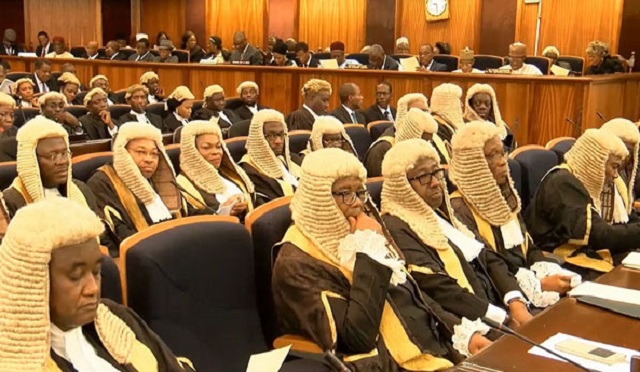As the federal government moves to increase the salaries and welfare packages of judicial officers, lawyers are reviewing how the increase would bridge the gap between the current pay of judges and their workload.
With 1,179 judges in Nigeria, according to the National Judicial Council (NJC), cases pile up when those in the high courts have up to 20 cases in their cause lists per day and are expected to deliver judgments within three months of adoption of final addresses.
In response to pressures for enhanced salary package for judicial officers, President Muhammadu Buhari on November 18 approved and directed measures for the immediate implementation of the enhanced salary and welfare scheme for judicial officers.
The Attorney General of the Federation and Minister of Justice, Abubakar Malami (SAN), made the announcement on behalf of the president during the official commissioning and handing over ceremony of Nabo Graham-Douglas Campus of the Nigerian Law School, Port Harcourt, Rivers State to the Council of Legal Education.
NLC tasks Kano to settle pension arrears
Kogi NNPP candidate, 2 others charged with N1.4bn fraud
He said the president has directed the chairman, Revenue Mobilization and Fiscal Allocation Commission and the Attorney General of the Federation and Minister of Justice to promptly commence measures towards realization and implementation of enhanced salary and welfare scheme for the judicial officers in the country.
A statement by the media aide to Malami, Dr Umar Gwandu, quoted the president as targeting significant strengthening of the capacity and independence of the judiciary which, he said, remained a pillar of strength and stability for the nation’s democracy.
“This administration will, therefore, continue to support efforts to transform the judiciary, as part of a critical strategy, in ensuring a fair, progressive and prosperous society, with the rule of law as its cornerstone,” he said.
He said the president also called on the judiciary to continue to uphold the ethics of their profession and operate with accountability and probity in the exercise of their judicial and administrative duties.
The struggle for increased salaries and emoluments for judicial officers has been a long one. The office of the Attorney General of the Federation and the former Chief Justice of Nigeria, Justice Tanko Muhammad, had in 2021 called for a review of judges’ salary.
While presenting a 17-page paper to the Senate Committee titled “Input by the Judiciary to the Proposed Alteration to the 1999 Nigerian Constitution (as amended) under item 38”, he suggested that Part I of the Third Schedule, Paragraph 21 be altered to include sub-paragraph ‘h’ to the effect that the NJC should “fix, in conjunction with the Salaries and Wages Commission, salaries and other emoluments of judicial staff; in the case of judicial officers, to review such salaries no later than four years from the last exercise.”
Similarly, in a case filed by Sebastine Hon (SAN) seeking an upward review of the salaries and allowances of judicial officers, a National Industrial Court in Abuja on July 15 ordered the federal government to review the salaries and allowances of judicial officers in the country.
Justice Osatohanmwen Obaseki-Osaghae ordered the federal government to commence a monthly payment of the sum of N10m to the CJN; N9 million to other justices of the Supreme Court; N9m for the President of Court of Appeal, and N8m for other justices of the appellate court; N8m for the chief judges of both federal and states high courts, and N8m and N7m to other judges of the courts.
Hon had filed the originating summons against the Revenue Mobilisation and Fiscal Commission (RMAFC), the Attorney General of the Federation (AGF) and Minister of Justice, and the National Judicial Council (NJC) as defendants.
He contended that under sections 4(1), (2), and 8(1) to (4) of the Nigerian Constitution with Section 6(1) (d) and parts A and B of the Fiscal Schedule to the RMAFC, it is unconstitutional for the revenue commission to refuse, fail, neglect or ignore to upwardly review the salaries and allowances of judicial officers since 2008.
While some lawyers have expressed support for the judgement for the implementation of a salary rise for judges, others questioned the jurisdiction of the court to entertain the suit and the interest of the presiding judge, who was going to be a beneficiary in the judgment.
The CJN, Justice Olukayode Ariwoola, had at the inauguration of the new Senior Advocates of Nigeria, stressed the need to revisit the welfare of judges in Nigeria with emphasis on the financial independence of the judiciary in the manner spoken by the ex-CJN Tanko Muhammad.
“Prices of goods and services are not getting less or friendly to buyers; while at the same time; our purchasing power is abysmally low and weak enough to transmit on the same wavelength with the market forces.
“The only thing I can do at this juncture is to plead with the other arms of government and allied agencies to clear all the impediments so we can enjoy our independence holistically.
This is a clarion call to the other two arms of government to make the funding of the judiciary a major priority.
“Our extremely poor and pitiable salary package has become another major issue of concern that equally has to be attended to with the urgency it requires.”
Similarly, a former Director-General of the Nigerian Institute of Advanced Legal Studies, Prof. Epiphany Azinge (SAN), expressed support for the agitation for increase in the salary of judges.
He said, “Let it be on record that the judiciary deserves the best, because you cannot be accusing judges of corruption and at the end of the day you are still starving them.”
E.M.D. Umukoro Esq, however, queried what kind of salary would be agreeable for judges as the standard wage, when the economy has been mismanaged by the politicians, adding that “a better economy is better than a better salary; no amount of increase in their salary will solve the problem of a bad economy.”
On his part, Hamid Jimoh Esq said the increase in the emolument of judges has been unnecessarily delayed when the judiciary is supposed to be an independent arm of government.

 Join Daily Trust WhatsApp Community For Quick Access To News and Happenings Around You.
Join Daily Trust WhatsApp Community For Quick Access To News and Happenings Around You.


